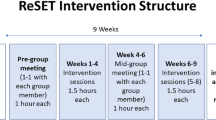Abstract
A universal cognitive behaviour therapy emotional health programme, FRIENDS, was provided in schools by trained school nurses to 106 children aged 9/10. Anxiety and self-esteem were re-assessed in 63 children one year after completing the programme. The significant improvements in emotional health identified 3 months after FRIENDS were maintained 12 month after completing the programme. Of the 9 children identified at baseline as high risk, 6 (67%) had moved into the low risk category by the 12 month follow-up. Of the low risk children, none had become high risk by follow-up. The study conclusions are limited by a small sample size and the absence of a comparison group. They are however consistent with previous studies and suggest that FRIENDS delivered in schools as a universal intervention can have a significant medium term effect upon emotional health.
Similar content being viewed by others
References
Barrett PM, Farrell LJ, Ollendick TH, Dadds M (I2006) Long-term outcomes of an Australian universal prevention trial of anxiety and depression symptoms in children and youth: an evaluation of the FRIENDS programme. J Clin Child Adolesc Psychol 35(3):403–411
Barrett P, Lock S, Farrell LJ (2005) Developmental differences in universal preventive intervention for child anxiety. Clin Child Psychol Psychiatry 10(4):539–555
Barrett PM, Lowry-Webster H, Turner CM (1999) Friends for Children participant workbook. Brisbane, Australia, Australian Academic Press
Barrett P, Turner C (2001) Prevention of anxiety symptoms in primary school children: preliminary results from a universal school-based trial. Br J Clin Psychol 40:399–410
Battle J (1992) Culture-free self-esteem inventories (2nd edn), Pro-Ed, Austin, Texas
Costello JE, Mustillo S, Erkanli A, Keeler G, Angold A (2003) Prevalence and development of psychiatric disorders in childhood and adolescence. Arch Gen Psychiatry 60:837–844
Durlak JA, Wells AM (1997) Primary prevention mental health programmes for children and adolescents: a meta-analytic review. Am J Commun Psychol 25:115–152
Ford T, Goodman R, Meltzer M (2003) Service use over 18 months among a nationally representative sample of British children with psychiatric disorder. Clin Child Psychol Psychiatry 8(1):37–51
Harrington R, Fudge H, Rutter M, Pickles A, Hill J (1990) Adult outcomes of child and adolescent depression. 1. Psychiatric Status. Arch Gen Psychiatry 47:465–473
Heijmens Visser JH, Ende J, Koot HM, Verhulst FC (2000) Predictors of psychopathology in young adults referred to mental health services in childhood or adolescence. Br J Psychiatry 177:59–65
Horowitz JL, Garber J (2006) The prevention of depressive symptoms in children and adolescents: a meta-analytic review. J Consult Clin Psychol 74(3):401–415
Horowitz JL, Garber J (2006) The prevention of depressive symptoms in children and adolescents: a meta-analytic review. J Consult Clin Psychol 74(3):401–415
Kendall PC (1994) Treatment of anxiety disorders in children: a randomized clinical trial. J Consult Clin Psychol 62:100–110
Kendall PC, Flannery-Schroeder E, Panichelli-Mindel SM, Southam-Gerow M, Henin A, Warman M (1997) Therapy for youths with anxiety disorders: a second randomized clinical trial. J Consult Clin Psychol 65(3):366–380
Kim-Cohen J, Caspi A, Moffitt TE, Harrington H, Milne BJ, Poulton R (2003) Prior Juvenile Diagnoses in Adults with Mental Disorder Developmental Follow-Back of a Prospective-Longitudinal Cohort. Arch Gen Psychiatry 60:709–717
Licence K (2004) Promoting and protecting the health of children and young people. Child Care, health Dev 30(6):623–635
Lock S, Barrett PM (2003) A longitudinal study of developmental differences in a universal preventive intervention for child anxiety. Behav Change 20:183–199
Lowry-Webster H, Barrett P, Dadds MR (2001) A universal prevention trial of anxiety and depressive symptomatology in childhood: preliminary data from an Australian study. Behav Change 18:36–50
Lowry-Webster H, Barrett P, Lock S (2003) A universal prevention trial of anxiety symptomatology during childhood: results at one-year follow-up. Behav Change 20:25–43
Meltzer H, Gatward R, Goodman R, Ford T (2003) Mental health of children and adolescents in Great Britain. Int Rev Psychiatry 15:185–187
Merry S, McDowell HM, Hetrick S, Bir J, Muller N (2004) Psychological and/or educational interventions for the prevention of depression in children and adolescents. Cochrane Database of Syst Rev 1:CD003380
Mrazek PJ, Haggerty RJ (1994) Reducing risks for mental disorders: frontiers for preventive intervention research. National Academy Press. Washington D.C
Rose G (1992) The strategy of preventive medicine. New York, Oxford University Press
Sheffield JK, Spence SH, Rapee RM, Kowalenko N, Wignall A, Davis A, McLoone J (2006) Evaluation of universal, indicated and combined cognitive-behavioural approaches to the prevention of depression among adolescents. J Consult Clin Psychol 74(1):66–79
Spence SH (1997) The spence children’s anxiety scale (SCAS). In: Sclare I (ed) Child psychology portfolio. NFER-Nelson, Windsor, UK
Stallard P, Simpson N, Anderson S, Carter T, Osborn C, Bush S (2005) An evaluation of the FRIENDS programme—a cognitive behaviour therapy intervention to promote emotional resilience. Arch Dis Child 90(10):1016–1019
Stallard P, Simpson N, Anderson S, Hibbert S, Osborn C (2007) The FRIENDS emotional health programme. Initial Findings from a School-Based Project Child and Adolescent Mental Health 12(1):32–37
Wells J, Barlow J, Stewart-Brown S (2003) A systematic review of universal approaches to mental health promotion in schools. Health Edu 103:197–220
Woodward LJ, Fergusson DM (2001) Life Course Outcomes of Young People With Anxiety Disorders in Adolescence. J Am Acad Child Adolesc Psychiatry 40(9):1086–1093
Author information
Authors and Affiliations
Corresponding author
Rights and permissions
About this article
Cite this article
Stallard, P., Simpson, N., Anderson, S. et al. The FRIENDS emotional health prevention programme. Eur Child Adolesc Psychiatry 17, 283–289 (2008). https://doi.org/10.1007/s00787-007-0665-5
Accepted:
Published:
Issue Date:
DOI: https://doi.org/10.1007/s00787-007-0665-5




